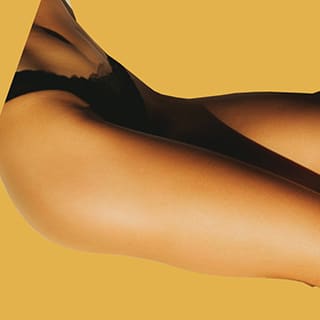
The Skinny
As natural as it may be, for most women (and many men), society has long considered body hair to be unsightly, shameful, and even taboo. While a full head of lush, beautiful hair is ideal for both men and women, the opposite is true when it comes to the rest of our bodies. While hair loss is a huge concern when it comes to the hair on our heads, our society goes to great lengths to remove body hair completely—or at least to keep it well under control, and has done so for decades.
In the 30s, some American women used pumice stones or sandpaper to sand off hair from their legs and underarm areas. While this certainly would have helped with the exfoliation process in these areas, these crude hair removal tools and treatments most likely were not very comfortable or effective. Soon after, these types of harsh treatments to remove women’s body hair began to fizzle out, replaced by tweezers, innovative new electric shavers and disposable razors by companies like Gillette® and Remington®, sugaring, waxing, and other remedies. It wasn’t until the 90s when laser removal options were approved by the FDA, along with the advancement of new methods for performing electrolysis, the only permanent hair care removal technique.
Today, hair reduction techniques like laser therapy, electrolysis, and IPL treatments are more advanced than ever before and designed to adapt to our busy lifestyles with products that can be used at home. Whether you’re seeking out a permanent solution to remove body hair forever, or simply looking for a temporary fix that can make you hair-free for a few days or weeks, hair removal has never been as easy or accessible as it is now.
If you’re looking for great solutions for removing your unwanted body hair, this article will fill you in on five of the most popular treatments on the market today: electrolysis, laser hair removal, IPL for unwanted hair, threading, and waxing.
AEDIT
Before & After Images by Provider









Before & After Images by Provider
Hair Removal Solutions
The Specifics
Overview
The process of hair removal, commonly known as epilation or depilation, is defined as the deliberate removal of body hair. With a 50% increase in laser hair removal procedures in the US in the past two decades, it comes as no surprise that the market for hair removal services is on the rise. Whether it’s arm hair, leg hair, facial hair, or any other kind of body hair, countless procedures and treatments have been developed to remove it—in response to the growing demand for easy and affordable hair removal.
While razors remain a popular and inexpensive choice for removing stubble on the legs, underarms, and other areas, shaving has never been a particularly effective method for removing hair from the body. Not only is it difficult to get a close, clean shave with a razor and shave gel, but razor burn, ingrown hairs, and rapid hair regrowth after shaving are common reasons why many people turn away from this method and begin searching for a longer-lasting, superior alternative for hair removal.
In the last three decades, laser hair removal, IPL, waxing, electrolysis, and threading have become some of the most popular methods for hair removal in the country. Depending on what your reasoning for wanting to remove your hair and your budget, some techniques may be better for you than others. If you’re hoping to find a better method for removing your unwanted body hair than what you currently are used to, take a look at some of the details of each of these treatments, and how they can work for you.
What Hair Removal Techniques Are There?
There are many different ways to remove unwanted body hair, and a wide variety of products and procedures on the market like electric shavers, hair removal creams, and sugaring treatments. While the options for professional and at-home hair removal methods might seem endless, there are five hair removal treatments in particular that have pushed their way to the forefront of the industry over the last three decades or so.
The first technique is laser hair removal, which is perhaps the most well-known and administered treatment available for permanent hair removal today. Laser hair removal accounted for more than one million procedures in 2017 alone, surpassing the 735,000 procedures in the year 2000.
The second technique is known as electrolysis, a shortwave radio frequency technique used for hair removal and administered by a licensed dermatologist. Dermatologists are easy to find in major cities like Dallas, Las Vegas, and New York, and smaller cities and towns across the country. Used as a long-term, permanent hair removal procedure, electrolysis is an effective procedure that’s backed by the FDA.
IPL treatments (also known as Broad Band Light (BBL), or photofacial), the third procedure on our list, presents a cheaper alternative to laser treatments and electrolysis, and it can even be administered at home with the use of a specialized IPL hair removal device. It is more effective when used to target darker, thicker hairs and less effective on lighter hairs, which is sometimes referred to as “peach fuzz.”
The most popular at-home treatment is waxing, which has been around for decades. This is a treatment that many are familiar with as it is widely used as a quick solution for removing unsightly hair from the root, without the use of a razor. While professional waxing is an option, especially in places like the eyebrows where expert personal care and precision is necessary, waxing can also be done at home with a purchased waxing kit—which is a cheaper and more convenient option.
Threading is one of the oldest facial hair remover techniques on the list, that has been practiced for centuries in the Middle East, Egypt, and India. In recent years, the practice has exploded in popularity, with shops and stands set up in shopping malls to express threading for those who are on-the-go. Full-service salons and beauty clinics have also begun adding threading to their list of services, especially as a way to expertly shape the eyebrows with precision.
What Benefits Can I Expect from Hair Removal Treatments?
The benefits of hair removal can vary depending on what you are trying to achieve. For example, eyebrow threading can help enhance your facial features with a precise, flattering brow style. Waxing is a popular solution for removing body hair in areas like the legs, the bikini line and the bikini area, and underarm hair because it often results in softer, smoother skin and is much faster than threading.
When it comes to permanent hair removal skin solutions, many people benefit from the added convenience of not having to shave again after treatment. With the number of razors, shaving cream and time spent shaving, investing in a good hair removal procedure could be well worth the money—especially for those living a fast-paced lifestyle.
The most popular benefit of hair removal treatments is the actual effect on your appearance. Unwanted body hair can be embarrassing, unsightly, and unattractive, and removing it—whatever method you decide to use—can be extremely beneficial for improving your self-esteem and confidence.
Who is a Good Candidate for Hair Removal?
For most people who have unwanted hair on their face or body, any of the above hair removal procedures would be a good fit. Ideal candidates for hair removal are usually anyone that wants a temporary or permanent solution for removing unwanted hair. Other good candidates for hair removal procedures include patients that need to remove hair in preparation for a medical operation or a surgical procedure.
For laser hair removal treatments and IPL, the best candidates are those hoping to get rid of unwanted hair on their face and body and have lighter complexions with darker hair colors. The best candidates for threading are those that want to remove body hair without using a technique that involves heat.
Who Should Not Have These Procedures?
For all hair removal procedures, there are some general guidelines to consider to determine whether you might be a good candidate for each one.
For those with light colored hair or fine hair of any color, laser hair removal is not recommended. Also, IPL for unwanted hair is not recommended for use on darker skin tones due to the risk of hypopigmentation. It should be mentioned, however, that while it’s also not recommended for use on darker skin tones, laser hair removal can be safely done on darker skin tones by an experienced practitioner using a long pulsed ND: YAG laser with a cooling tip.
If you have an active skin infection, keloid scarring, hemophilia, or have received dermabrasion or facial plastic surgery in the past six months, electrolysis should be avoided. Due to the harsh nature of the chemicals used in the galvanic electrolysis process, application in areas with skin infections can worsen the infection.
Waxing is a relatively universal procedure that is used by just about anyone. However, those who are taking Accutane or Retina-A, or have received dermal injections, laser treatment, or chemical peels in the previous two weeks, should not wax where the skin has been treated. Those with extremely dry skin can also experience problems with waxing, and therefore this method is not recommended in those cases.
Threading, like waxing, is generally safe for most people looking to remove unwanted hair. The only exceptions would be candidates with active cold sores, sunburns, conjunctivitis, psoriasis, or other skin infections, as threading could irritate symptoms.
Are Hair Removal Procedures Painful?
The most common question that potential hair removal candidates have is whether the procedure is going to be painful. For the first three techniques we mentioned: laser hair removal, electrolysis, and IPL, the treatments can be painful, especially for those with sensitive skin. To help manage the pain, your medical professional or dermatologist will apply local or topical anesthesia to the areas being treated, which will reduce the pain felt during the process. There may be low-grade pain associated with those experiencing side effects after treatment, but most patients will not experience any pain at all once the procedure is completed.
Threading, when done correctly, is usually associated with minimal discomfort. Many people who have had their eyebrows threaded have stated that it is less painful than using tweezers, though others maintain that threading is more painful than waxing, as the hairs are removed one-by-one in a slower and more careful process.
The last procedure, waxing, has a widespread reputation for being a fast but painful procedure, though it is performed without any anesthesia or numbing cream. While reports of the pain from waxing can range from minimal to excessive, the actual pain you feel during this procedure will depend on your skin sensitivity and individual pain tolerance. After most professional waxing sessions, a cooling salve or lotion is applied to the treated skin immediately afterward, which can help soothe the pain after treatment.
What Does Hair Removal Cost?
As with any medical procedure, the cost of each technique will vary depending on how complex the total procedure is, who is performing the procedure, and where you are having it done. In this section, we’ll walk through the cost of each technique to give you a better idea of what may or may not fit your budget.
Laser Hair Removal: For one session of laser hair removal, you can be expected to spend anywhere from $350 a session at the very minimum, and up to $900 a session for larger or combined treatment areas.
Electrolysis: With the complexity of the procedure and need for a licensed dermatologist, the Electrolysis process is typically the most expensive option for hair removal. Successful electrolysis treatments will involve several sessions to remove hair permanently and can cost anywhere from $1000 to $20,000 overall.
IPL: As one of the more expensive treatments, IPL can cost between $350 a session to $600 a session.
Waxing: Waxing sessions can easily be done for $10-$100 per treatment area. If done at home, obviously the price will be much lower than having your body professionally waxed. Wax products for home use can range from $10 to $100 depending on the kit, the type of wax treatment, and the hair removal products and materials included. For example, the Ultimate Hot Waxing Super Pack by Parissa contains everything users will need to remove unwanted body and facial hair at home and starts around $45.
Threading: Threading is inexpensive, fast, and convenient. In most cases, facial threading is split up into areas (chin, eyebrows, upper lip, etc.), and will cost about $5-$20 per area treated.
Are There Any Potential Side Effects or Complications from Hair Removal?
When having a treatment such as laser hair removal, electrolysis, and IPL, there will be some risks and minor side effects to watch out for during and after the procedure. These side effects include tenderness, redness, and some swelling in the areas that have been treated. In a small percentage of patients, severe side effects have included permanent scarring and pitting.
For those using waxing or threading treatments, you can expect to experience temporary side effects on a much smaller scale when compared to the above treatments. Side effects may include temporary redness, sensitivity, irritation, and burns.
How Many Treatments Are Needed to See Results?
Waxing and threading offer instant results, though the effects are not permanent and hair will grow back within one to four weeks.
For laser hair removal, seven treatments every three to eight weeks should result in long-lasting hair removal for most patients. Similarly, IPL will require eight to ten treatments every four to six weeks to achieve the best results. The longest treatment time, electrolysis will need many more treatments to permanently remove the unwanted hair forever and can mean 18-100 treatments spaced one to four weeks apart.
Are Results Permanent or Temporary?
While most of the procedures we have listed are for temporary to semi-permanent results, electrolysis is the only procedure that can offer permanent and lasting results.
For laser hair removal, the treatment will reduce hair growth, but not eliminate it. Similarly, after IPL, the hair will still grow, but at a slower rate than before. Waxing and threading offer excellent, but temporary results that will require continual upkeep and touch-up treatments—usually once every three to four weeks.
What is the Process of Hair Removal Like?
Laser hair removal involves the use of a single wavelength of light to remove unwanted hair from the body. The wavelength of light produced by the laser is absorbed by the hair and converted into heat, damaging the hair follicles. By doing this, the damaged follicles are inhibited or delayed in producing new hair growth patterns, and hair is removed from the body.
The electrolysis procedure can be performed in three different ways: galvanic, thermolytic, or a combined process. In both methods, a dermatologist will insert a tiny needle with an electric current into the hair follicle, though the difference between the two processes lies in the way the hair follicles are destroyed. In galvanic electrolysis, the hair is destroyed in a natural chemical process that disables the hair follicle and causes it to fall out. In thermolytic procedures, heat alone is used to destroy the cell tissue found at the root of each hair and is generally considered to be a faster but less effective alternative to the galvanic method of electrolysis.
IPL, short for intense pulsed light, works very similarly to laser hair removal. The key difference between the two treatments is that IPL delivers an intense pulse of light made up of a broad spectrum of light wavelengths. Whereas laser hair removal uses only a single wavelength of light to specifically target and remove hair from the body, IPL uses a broad band of wavelengths to kill hair follicles at the root of each hair. After repeated use, the regrowth of hair in the treated areas slows down dramatically for permanent hair reduction.
Temporary solutions for hair removal have also come a long way in recent years, though waxing has remained as one of the most convenient, effective, and quickest ways to remove hair for many decades. The process is easy: melted wax is heated to a high temperature and applied over clean, dry skin (not wet), and the unwanted hair in small areas. Seconds later, the wax will be removed. Depending on the type of was, a cloth strip may be placed over the wax while it’s still hot, and the wax strip is quickly pulled off in one short, brisk motion once the wax has cooled down.
Threading is one of the most intricate procedures on this list as it is usually done by those who have mastered the technique. As a procedure that has been done for hundreds of years, the technique has been passed down from generation to generation and is often professionally taught. Threading is similar to tweezing or waxing hair from the face, except that it uses a thread to quickly remove each hair follicle one-by-one. This technique is usually used only on facial hair, with most men and women using it to shape and remove excess hair from their eyebrows.
How Long Does it Take to Recover from Hair Removal Treatments?
One of the major benefits of hair removal procedures is the minimum time needed to recover your treatment. As waxing and threading are non-invasive, casual cosmetic procedures, no recovery time is needed after treatment, though reddening of the skin can last for up to an hour or so after the process.
Laser hair removal also counts with a fast recovery, as the process is gentle and does not involve any invasive or abrasive techniques. For electrolysis and IPL, you will have a 1-2 recovery day period after treatment, depending on the details of your process, your skin’s reaction to the procedures, and the size of the area being treated.
What is the Recovery Process Like?
For IPL and electrolysis, the only procedures that come with a prolonged recovery period after treatment, recovery can take one or two days. To reduce discomfort, patients are usually instructed to apply ice to the areas treated and to sleep in an inclined position to minimize swelling.
The Takeaway
Conclusion: The Pros and Cons of Hair Removal
Today’s alternative skincare and hair removal treatments offer a variety of benefits like smoother skin and longer-lasting results. These treatments will also save you plenty of time that you might otherwise spend struggling with a razor every couple of days, and hair that will disappear for weeks, months, or even for a lifetime, instead of mere days.
As efficient and convenient as these alternative options may be, there are pros and cons to every procedure. For example, those interested in laser hair removal will benefit from a low recovery time, reduced hair growth, and the ability to remove hair precisely—although the process also requires multiple sessions, an expensive cost, and a non-permanent solution to hair removal.
Electrolysis treatments, on the other hand, offer completely permanent results at a high cost. Electrolysis can be extremely expensive, and like laser hair removal, it will require many sessions and consistent treatments.
IPL users can expect a quick treatment and reduced hair growth, but will also require multiple sessions and the added expense.
Waxing is one of the most convenient options for hair removal as it is safe, effective, and can be done at home. The only downfall is that the hair will need to be longer for removal, which means waiting through an uncomfortable growth period before eliminating the hair, and also that the removal process can be painful.
Threading is the only non-invasive, no-chemical option on our list which makes it great for people who want an affordable, natural solution. The biggest downside to threading, however, is that the process removes very little hair at a time, and is usually only used for the face.
Additionally, both waxing and threading are not permanent solutions, and regular upkeep will be required every three or four weeks, depending on how fast your hair grows.
Even though each method for removing hair involves its list of pros and cons, each one that we’ve mentioned in this article is widely considered to be far superior to other, more common hair removal methods, like shaving or plucking. In fact, these advanced treatments are guaranteed to offer far better results than when shaving with even the most innovative razors, like the Venus Swirl from Gillette®, plucking with fine quality tweezers from award-winning, industry-leading manufacturers like Tweezerman®, or using popular hair remover creams like Nair™.
For those that are desperate to find the answer to long battles against the unwanted hair growth, one of these treatments to remove hair permanently, semi-permanently, and even temporarily—may provide the peace-of-mind you’re looking for.


